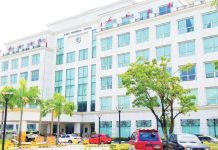[av_one_full first min_height=” vertical_alignment=” space=” custom_margin=” margin=’0px’ padding=’0px’ border=” border_color=” radius=’0px’ background_color=” src=” background_position=’top left’ background_repeat=’no-repeat’ animation=”]
[av_heading heading=’ Bacolod puts videoke bars in crosshairs’ tag=’h3′ style=’blockquote modern-quote’ size=” subheading_active=’subheading_below’ subheading_size=’15’ padding=’10’ color=” custom_font=”]
BY MAE SINGUAY and DARYL LASAFIN
[/av_heading]
[av_textblock size=” font_color=” color=”]
BACOLOD City – City hall will soon strictly enforce the ordinance regulating noise pollution. It covers videoke establishments, City Administrator John Orola said.
Several residents, especially from subdivisions, complained about the noise produced by such businesses, especially at night, Orola told the press.
He cited videoke and sing-along establishments on Lizares Avenue and Santa Clara Subdivision in Barangay Mandalagan.
Orola urged the establishments’ owners to be considerate, especially to nearby residents who are sick or having difficulty sleeping.
He claimed the ordinance allows videoke/karaoke operation only until 11 p.m. and mandates the closure of erring establishments.
For occasions needing videoke/karaoke operation like fiestas and birthdays, organizers must first get from the city government a permit detailing the period of time of the celebration, said Orola.
THE ORDINANCE
The Sangguniang Panlungsod approved the local law regulating noise pollution on Jan. 15, 2004, or almost 13 years ago.
City Ordinance No. 356 elaborates scientific steps in sound regulation — from defining “ambient noise standards” (classifying certain areas and the number of decibels allowed in each) to mandating the city government to acquire a “sound level meter” in carrying out its provisions.
Videoke and sing-along establishments are covered by Article 4 (a). But contrary to Orola’s claim, this provision of the ordinance does not provide for a time limit to the establishments’ operations.
Instead, it mandates videoke/sing-along establishments to “see to it that [they are] equipped with soundproofing devices, walls or enclosures so that the surrounding community will not affected by said music.”
They must also “ensure that [their] sound…does not exceed the allowable sound level limits,” and “if it does, [they have] to bring it down to said allowable limits or enclose [the establishment] with soundproofing devices, walls or enclosures.”
Penalties for violations include fines ranging from P500 to P3,000 for individuals and from P1,000 to P5,000 for entities. Those who have violated the ordinance more than three times face a maximum penalty of 30 days to a year of imprisonment and permanent closure of establishment or confiscation of noise-causing object.
The ordinance exempts sound production of “temporary or occasional nature,” such as during New Year’s celebrations, MassKara Festival street-dancing, drum and bugle competitions, and rallies.
PREVIOUS ADMIN
In 2014 the city council already urged the executive department under then mayor Monico Puentevella to enforce the ordinance.
A resolution authored by then councilor Jocelle Sigue cited videoke/karaoke/sing-along establishments, especially in residential areas, that cause excessive noise in the wee hours of the morning.
“[The] sound becomes unwanted when it either interferes with normal activities such as sleeping [and] conversation, or disrupts or diminishes one’s quality of life,” the resolution stated.
It was not immediately clear how the Puentevella administration responded to the city council’s resolution.
City hall will tap the Bacolod City Police Office in enforcing the ordinance, Orola said. He also asked barangay officials to remind videoke/sing-along establishment owners and operators about the ordinance./PN
[/av_textblock]
[/av_one_full]







